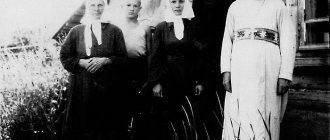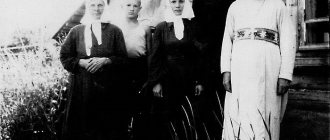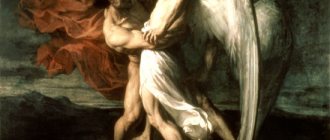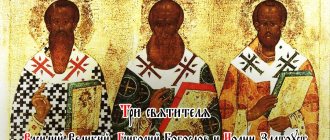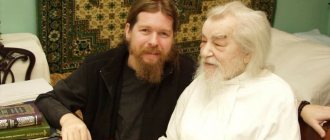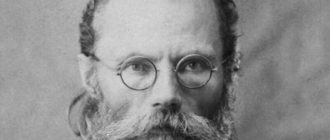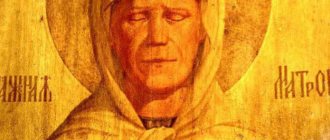Osipov Alexey Ilyich is a leading expert in the field of theology, professor and teacher at the Moscow Theological Academy. Osipov's lectures, conversations and sermons are distinguished by subtle humor, accessible presentation and deep knowledge of the subject of discussion. He celebrated his 80th birthday in March 2022.
Childhood
Alexey Osipov was born on March 31, 1938 in the city of Belev, Tula region.
Origin and birth
About A.I.’s relatives Osipov and about the earliest years of his life there is very little information. It is known that he was born into a family of Soviet employees, his father was a military man, his mother worked in a store. Having changed several cities, in 1952 the Osipovs settled in the city of Gzhatsk (now the city of Gagarin) in the Smolensk region.
Family
About his childhood A.I. Osipov says very little and reluctantly, repeating every time he is asked about it that public confession was abolished back in the 1st century AD. It was then that it was decided that a person should confess one-on-one with a priest, so he would have nothing to tell about his past to a wider audience.
When Alexey was 6-7 years old, his mother, Olga Mikhailovna, began going to the temple, whose rector was Father Nikon (A.A. Vorobiev). Subsequently, he had a huge influence on the spiritual development of young Alexei Osipov, and later became his spiritual father. Until his death in 1963, Father Nikon was for Alexei Ilyich an example of a true Christian, an intelligent mentor, a wise and kind friend.
Schooling
Alexey Osipov graduated from high school in Gzhatsk in 1955. He was very short in stature (due to a spinal injury he stopped growing), and from school moments, he spoke about him in his speeches, the most vivid memory was associated with his spiritual father, Abbot Nikon.
All summer, for about 2-2.5 months, Father Nikon measured it with a ruler and made a mark on the door, saying: “Well, look, you’ve grown a little again.” He so strengthened the boy’s belief that he had grown up that when Alexey entered the classroom on September 1, everyone was simply amazed: over the summer he had grown by 15 centimeters! Today Alexey Ilyich sees in this the power of persuasion of his mentor and does not tire of cultivating this quality in himself.
When the time came to join the Komsomol, Alexei flatly refused to do so and remained “unreached.” The reason for his action is unknown, but perhaps it all has to do with the religious beliefs of young Alexei, to which his mother and father Nikon introduced him.
Teenage years and early life
After graduating from high school, Alexei Osipov was faced with the question of further education. The management of the school where he studied suggested that he enter some institute, but his mentor, Abbot Nikon, advised Alexei to choose a different path.
Study of Theology
Over the next 3 years, Alexey Osipov, under the guidance of his spiritual mentor, prepared to enter the Moscow Theological Seminary. The emphasis was on studying the lives of the holy fathers and their interpretation of the foundations of the Christian faith.
In 1958, having received a written recommendation from Abbot Nikon, Alexey Osipov was enrolled in the 4th (graduating) class of the theological seminary, which he successfully graduated from in 1959. As Alexey Ilyich later recalled, even the seminary teachers did not give such deep knowledge in theology and the study of the works of the holy fathers that the Mentor gave him to their students.
Next, Osipov entered the Moscow Theological Academy, graduated from which in 1963, received a candidate of theology degree and was sent to work in one of the churches in the city of Smolensk (the topic of the dissertation is “Translation of the rites of Matins and Vespers according to the 1951 edition of the service book of the Greek Church in comparison with Russian service book of the synodal publication"). Osipov did not work in his new position for long. At the invitation of a higher educational institution of the Russian Orthodox Church, he enters graduate school.
Mature age
At the age of 26, in 1964, Alexei Osipov completed his graduate studies, having attended a course at the Theological Academy.
Teaching at the Academy
Immediately after completing his postgraduate studies, Osipov was appointed there as a teacher of basic theology and the new discipline of Ecumenism for that time (pan-Christian cohesion, the desire for the unity of all religious communities in the Universe). While working in his new position, Alexey Ilyich simultaneously lectures at the theological academy in the first year and at the seminary in the fifth year on the fundamentals of the Christian faith, theology and Western religions.
Since 1969 Osipov has been an associate professor, and since 1975 a professor at the Theological Academy. Since 1990, for three years, he was the editor-in-chief of the Theological Academy publication “Theological Bulletin”.
Work in the Russian Orthodox Church
In 1964, Osipov was appointed secretary of the commission of the Russian Orthodox Church (ROC) for the preparation of materials for a religious and ethical encyclopedia, the publication of which was planned to be carried out in Athens.
From 1973 to the present, Professor Osipov has been actively involved in the activities of the Russian Orthodox Church:
- was a member of the educational committee of the Theological Academy under the Holy Synod (the governing body of the Russian Orthodox Church) until 1986;
- was a member of the Holy Synod Commission on Christian Unity until 2004;
- in 1988 he was a member of the Anniversary Local Council of the Russian Orthodox Church
- from 1994-1995 was a member of the coordinating committee for interaction between the Armed Forces of the Russian Federation and the Russian Orthodox Church
- from 1995-1997 — member of the permanent Presidium of the World Russian Councils of the II-IV convocations;
- was a member of the Church and public group for the preparation of the celebration of the 2000th anniversary of the Nativity of Christ;
- was a member of the Synodal working group to develop the fundamentals of the concept of the Russian Orthodox Church;
- since 2009 - member of the presidium of the Inter-Council Presence and its commission on church education.
- took part in bilateral dialogues of the Russian Orthodox Church with other religious denominations.
It should be noted that today the attitude of the Russian Orthodox Church to the lectures and worldview of Professor A.I. Osipov is ambiguous. On the one hand, in the field of Basic Theology (apologetics), he is undoubtedly the largest specialist; as for Dogmatic Theology (sections of the doctrine of salvation, the final destinies of the world and man), here, according to the conclusion of the Synodal Biblical Theological Commission (2016 g.), the professor’s lectures do not correspond to Orthodox dogma, based on Divine revelation.
This video presents an excerpt from a lecture by Professor A.I. Osipov "About ten righteous people".
Social and political activities
Professor A.I. Osipov actively participates in public and political life:
- from 1996 to 1987 and from 1995 to 2005. was a member of the editorial board of the collection “Theological Works”;
- from 1991 to 2016 — was the co-chairman (from religion) of the annual international conference “Science. Philosophy. Religion";
- was a participant in the assemblies of the World Council of Churches;
- participated in the conference of European churches;
- took part in the Christian Peace Conference;
- was invited to many world-wide international and other church and public conferences and assemblies in Russia and abroad.
Participation in television programs
Alexey Ilyich Osipov speaks a lot:
- at meetings with students of theological academies;
- with believers;
- on TV.
Professors are often invited to give lectures, and they always ask a lot of questions. His performances can often be seen on the Orthodox channel “Soyuz”.
Viewers are extremely concerned not only with questions of faith, but also with the personal life and marital status of the professor, whether he has children, whether he is married or not. However, Osipov never talks about himself personally. He believes that his biography and personal life are not a reason for discussion.
It is much more important to talk about what he sees as his purpose:
- Bring to those present the messages of the holy fathers.
- Discuss issues of Orthodoxy and Christianity.
For example, to the question of one of the TV presenters: “What is the main difficulty a person has today on the path to the temple, faith, to God? What do you think?”, A.I. Osipov responded like this:
“Nowadays it is difficult for a person to get out of the atmosphere of life in which we are immersed. The most difficult thing is the vanity that takes up all our time and fills our heads. We don’t have time to think about anything: even about our soul and about God. This is the vanity, this is the distraction from the pressing question: “Why am I living?” A person does not have time to somehow comprehend himself. This is entertainment, this is entertainment that is everywhere now, this is the media that immerse us in a completely different, literally anti-Christian world. All this greatly hinders a person from coming to God. We don’t read anything, we don’t even read the New Testament. Lack of interest, some kind of apathy, some kind of lukewarmness, about which the Apocalypse says: “Since you are neither cold nor hot, I will vomit you out of My mouth.” Murderous indifference: “It doesn’t matter, I don’t care about all these religions, about everything, I live the way I live,” this is the main problem, it seems to me.
In addition to teaching and socio-political activities, A.I. Osipov does a lot of journalism. His works are published in various domestic publications (Journal of the Moscow Patriarchate, Theological Works) and foreign media in Italy, Greece, the USA, Finland, and Germany.
The professor has numerous awards, including from the Russian Orthodox Church:
- Order of the Holy Blessed Equal-to-the-Apostles Prince Vladimir, III degree (1971);
- Order of St. Sergius of Radonezh, III degree (1979);
- Order of the Holy Blessed Equal-to-the-Apostles Prince Vladimir, II degree (1988);
- Order of the Holy Blessed Prince Daniel of Moscow, III degree (1998);
- Order of St. Macarius, Metropolitan of Moscow and All Rus', III degree (2008);
- Order of St. Macarius, Metropolitan of Moscow and All Rus', II degree (2013);
- Order of St. Macarius, Metropolitan of Moscow and All Rus', 1st degree (2018).
This video shows an excerpt from a lecture by A.I. Osipova “How to determine your professional purpose: “By the sweat of your brow eat your bread.”
Professor Alexey Ilyich Osipov. Lectures and talks
Andrey writes: “What cowardly, illiterate and uneducated people you are.”
Answer: Andrey, apparently, because of your generosity, you allow yourself insults, calling us cowardly. Next you call us illiterate. Then let me ask, if you are multiliterate, why don’t you see dangerous errors in the works of Alexei Ilyich? And, if you call us uneducated, and you should be educated, then why are such mistakes made here, in this same post, that will be shown below?
Andrey: “Well, Alexey Ilyich in all his lectures always speaks referring to the Holy Fathers, and not from himself.”
Answer: Well, indeed, Alexei Ilyich contains patristic quotations, and there is no contradiction in them on some individual topics. At the same time, upon careful examination, Alexei Ilyich also encounters other moments when he gives quotes and attaches arbitrary meaning to these quotes. The Holy Scripture interprets in its own way, composes quotes from separate pieces, discarding essentially important parts of the internal text, which makes the quote take on a completely different meaning. Therefore, how can one assert here that he “always speaks”? He always MENTIONS the holy fathers, yes. But sometimes he cites the holy fathers QUALITATIVELY, and sometimes FALSELY.
Andrey writes: “Concerning the Ecumenical Councils.”
Answer: We are reproached that we allegedly do not know the rules of the Ecumenical Councils and do not interpret them correctly.
Andrey: “You first read the resolutions, and then speak, there is no need to condemn unfoundedly.”
Answer: We read the resolutions. And they revered, in particular, the rule of the Third Ecumenical Council, which anathematizes Celestius, which Alexey Ilyich clearly ignores. Alexey Ilyich claims that infants who die without being baptized necessarily enter heaven. This opinion was recognized as heresy and anathematized by the 124th Rule of the Holy Council of Carthage. Alexey Ilyich rejects the fair denunciations of his contemporaries, citing the fact that Local Councils do not have dogmatic power and says that the specified Rule is not true at all. But the professor, apparently, did not know that the same heresy was also condemned by the THIRD Ecumenical Council, which there is no longer any possibility of contradicting. Unfortunately, we must admit that A.I. OSIPOV REVIVED THE HERESY OF CELESTIA, condemned by the Church 1600 years ago.
Therefore, Andrey, it is ALEXEY ILYICH who needs to familiarize himself in more detail, in particular, with the rules of the Third Ecumenical Council and make sure that Celestius is anathematized.
Read about this from Abbot Nestor (Kumysh), from monk Venedikt, from S.M. Maslennikov...
There is no nonsense there. There are precise evidentiary statements with references to Holy Scripture and Holy Tradition.
Andrey: “they say: “Rules of the Ecumenical Councils,” but they themselves have forgotten that there are “oros” - teaching definitions are one thing; but the rules are something else.”
Answer: This 4th rule of the Third Ecumenical Council condemns the heresy of Celestius. And Alexey Ilyich pulls it out again and in his book “From Time to Eternity” constantly says this, without anathematizing the meaning. Also anathema to Origen, he rejects all this too. He also rejects the anathematism approved by the Ecumenical Councils.
Excerpt from “Open Letter to Professor Osipov” by Monk Benedict:
“If a teacher of a theological seminary and academy has forgotten the main dogmas of Orthodoxy and those anathematizations under which his new false teaching falls, and is imposing on students and all his readers and listeners something that is not what the Orthodox Church has always and everywhere taught and taught, I will try to remind you:
1. Those who deny the existence of God and affirm that this world is original and everything in it without the providence of God and happens by chance: anathema.
(Not only atheists fall under this anathema, but also those who teach (p. 90) that if they do not repent before death, they will be saved in the future life - comp.).
2. God who speaks is not spirit, but flesh; or His not being righteous, merciful, wise, omniscient and similar to blasphemy uttering: anathema.
(By denying the property of justice in God (pp. 90, 115, 118, 124, 128), you, Alexey Ilyich, fall under this anathema. Recognizing the possibility of saving pagans and heretics (pp. 90, 115, 131, 132), you You also fall under both this and all the following anathemas pronounced against such heretics - comp.).
3. To those who dare to say that the Son of God is not of one substance and not of equal honor with the Father, so is the Holy Spirit, and to those who confess that the Father, and the Son, and the Holy Spirit are not the same being of God: anathema.
4. Those who foolishly say that it is not necessary for our salvation and the cleansing of sins to come into the world of the Son of God in the flesh and His free suffering, death and resurrection: anathema.
5. To those who do not accept the grace of redemption, preached by the Gospel, as our only means of justification before God: anathema (this anathema also includes those who say that salvation is possible in other beliefs: pp. 90, 115, 131, 132 - comp. .).
6. To those who dare to say that the Most Pure Virgin Mary did not exist before the Nativity, at the Nativity and after the Nativity the Virgin: anathema.
7. To unbelievers, for the Holy Spirit made wise the prophets and apostles and through them to show us the true path to eternal salvation (including those who claim that their inspired words have only an “educational character” (p. 115) - comp.), and confirm this with miracles, and now it dwells in the hearts of faithful and true Christians and instructs them in all truth: anathema.
8. Those who take away the immortality of the soul, the end of the age, the future judgment and eternal reward for virtues in heaven, and condemnation for sins (pp. 90, 115, 118, 124, 128 - comp.): anathema.
9. To those who reject all the holy sacraments (pp. 90, 134, 135, 144, 145, 174, 175 – comp.), contained by the Church of Christ: anathema.
10. To those who reject the Councils of the Holy Fathers (who anathematized all the heretics, about whom you, Alexey Ilyich, claim that they will be saved (p. 90) - comp.) and their traditions, in agreement with Divine Revelation (!!!), and Piously preserved by the Orthodox-Catholic Church: anathema.
11. To those who think that in Orthodoxy Sovereigns are not elevated to thrones by God’s special favor for them, and when the gift of the Holy Spirit is anointed to the kingdom for the passage of this great title, they are not poured out on them, and so to those who dare to rebel and treason against them: anathema.
(Recognizing the possibility of saving everyone (p. 90), including the unrepentant revolutionaries who turned Holy Rus' into an atheistic state, you become an accomplice in their evil deeds (2 John 1:10–11) - comp.).
12. To those who scold and blaspheme the holy icons, which the Holy Church commemorates the works of God and His saints, for the sake of inciting those who look at them to piety, and accepts their imitation, and to those who say they are idols: anathema.
(I repeat once again that while recognizing the possibility of saving the iconoclasts and all the above-mentioned heretics (p. 90, 1), you, Alexey Ilyich, fall under all the anathemas pronounced on them - comp.)" https://www.protiv- heresi.ru/2014/10/311.html
Andrei: “There were even such rules, for violations of which violators were subjected to very severe punishments, penances, and were excommunicated for many years from communion.”
Answer: Andrey, you are confusing yourself. Where the terms of excommunication are indicated, this does not refer to the rules, but to the canonical messages of the holy fathers.
The canonical letters of the holy fathers also say that excommunications for very long periods were only for the most serious mortal sins - firstly; secondly, the period of penance may be reduced; thirdly, these rules do not apply to pagans during their churching in general; fourthly, although the person was baptized, he was not a church member at all and did not know anything, for this reason such rules were not applied either. You have to look at how churched a person was. But if you, Andrey, present yourself as EDUCATED, then you should know all this additional information that relates to the timing of excommunication. And to scare people like this, that there are such rules, that they are terrible, that they cannot be applied at all - this is a LIE!
Further, you, Andrey, quote Professor A.I. Osipov: “... Because the rule has several levels: from the very fundamental (for example, the installation of a bishop) to such everyday trifles (for example, is it possible to wash in a bathhouse with a Jew or not).”
Let's see what level this rule is: “is it possible to wash in a bathhouse with a Jew”? Did the Holy Fathers of the Ecumenical Councils, to whom Professor A.I. Osipov “loves to refer” so much, consider this rule to apply to EVERYDAY THINGS???
A.I. Osipov says: “I always give the same example, and everyone laughs, of course, but it is very good. One of the Rules: “If anyone takes a bath with a Jew, he is excommunicated from Communion...(I forgot, well, for how many years there).” So, well, try it now, come to the bathhouse and ask: “Is there a Jew here?” Well, what is this? There are a lot of such Rules there!”
“So, distorting the meaning of the Rule (like the 124th Rule of the Carthage Council), mocking the spiritual wisdom of the fathers of the Sixth Ecumenical Council, playing a mini-comedy with public baths, Alexey Ilyich discredits the authority of the Ecumenical Councils, emphasizing that “there are a lot of such Rules there " What does the expression “very much” mean? Is it more than half or less, a third or two thirds? All those people who completely trust Professor Osipov will no longer, apparently, trust the decisions of the Councils that dealt with some “strange” issues, “very many” of which, with the skillful presentation of Alexei Ilyich, make modern people laugh.
But let us cite this very 11th Rule of the Sixth Ecumenical Council: “None of those belonging to the sacred rank or of the laity should eat unleavened bread given by the Jews, nor enter into fellowship with them, nor call on them in illness and take medicine from them, nor It’s a good idea to wash with them in the baths. If anyone dares to do this, then the cleric will be deposed, and the layman will be excommunicated.”
It is not at all difficult to notice that in Alexei Ilyich’s skillful interpretation, the Rule looks completely different. Several deviations are clearly visible: instead of “Jews,” which indicates religious affiliation, the professor uses “Jews,” which indicates national affiliation;
Instead of a clear emphasis on the prohibition to enter into a commonwealth with the Jews, which is the main meaning of the Rule, all the attention and the whole meaning of the Rule comes down to the prohibition of washing with them in a public bath. This is the Evil way the respected MDA professor turns the 11th Rule of the Holy Fathers of the Sixth Ecumenical Council into a mini-comedy with public baths, which completely contradicts the spiritual meaning of the Rule.
If you look at the entire Rule as a whole, it will be clear that the Fathers of the Council prohibit entering into personal friendship with the Jews, as representatives of a religion that has REJECTED CHRIST and continues to await HIS MISSION, so as not to become infected with their spiritual illnesses. The mention of baths as an everyday matter is used by fathers as one of the examples of the manifestation of such personal friendship, when people who are closely acquainted go to each other’s baths. This shows that friendship even at the everyday level can have subsequent DANGEROUS spiritual problems. The Savior also speaks about this in His commandment: ... when leaving the house (...) shake off the dust from your feet (Matthew 10:14), that is, not only stop visiting their baths, but also do not leave their dust on your feet . Thus, the Fathers of the Council wisely warned Christians against actions that could lead to DEVIATION from the TRUTH and SPIRITUAL DEATH. Given a reasonable understanding of this Rule, there remains no reason to doubt that it is both relevant and applicable in our time. If you ignore it, then with the weak faith of modern Christians, it becomes very easy to become infected with the errors of infidels and heretics.”
As a result, Andrey, look, you are repeating absolutely everything that Alexey Ilyich said about the bathhouse, about the Jews in his “Detailed response to accusations of heresy.” Either you copied it from there, or Alexei Ilyich repeated it all to you a second time, but you yourself are in no way an independent, thinking, analyzing person. You are only copying what you are told. Why don’t you want to read for yourself, for example, Abbot Nestor (Kumysh) “On Eternity”. Read, compare, analyze whether Alexey Ilyich gives everything correctly, whether he interprets the quotes correctly. How many fair criticisms have been made there with references and evidence that Alexei Ilyich’s approach to these issues is not scientific. This was not accepted in theology. Therefore, with all the merits of Alexei Ilyich, with all the many of his lectures, which are in many ways useful, positive and very interesting, he also definitely has such erroneous and very dangerous moments. These erroneous points, which are a deviation from the Church, and even in two cases are a revival of two ancient heresies, are pointed out to him. Either he doesn’t want to watch it or read anything, or he treats his fair critics with contempt, but things aren’t moving forward. He stubbornly stands in his delusions and does not want to accept fair criticism. It is precisely for this reason, despite all his enormous merits, experience, age, education, literacy, erudition and memory, etc. I have to speak openly now. If a person has already been convicted of such terrible mistakes, if different people have already proven this to a person more than once and he still stubbornly stands in his error, then this must be recognized as a FIRM STANDING IN HIS ERROR, i.e. HERESIES. It is for this reason that so much is said about the danger of meaningless and harmful listening to his lectures, which contain these digressions.
LINKS:
Hegumen Nestor (Kumysh) “On Eternity.”
https://www.protiv-eresi.ru/2013/08/60.html
https://www.protiv-eresi.ru/2015/01/duhovnaia-zhizn-osipov.html
Monk Benedict “Open letter to Professor Osipov.”
https://www.3rm.info/49008-izoblichenie-eresi-osipova-otkrytoe-pismo-professoru-ai-osipovu-ot-monaha-venedikta.html
S.M.Maslennikov. “Refutation of the excuses of Professor A.I. Osipova".
https://www.uralzvon.site/refutation-of-the-professor-excuses/
S.M.Maslennikov. "Professor Osipov and one ancient heresy."
https://uralzvon.site/wp-content/uploads/2014/12/Professor-Osipov-and-an-ancient-heresy.pdf
Reply »
Lectures and sermons by Alexey Osipov
Theologian Osipov Alexey Ilyich actively gives reports and lectures on radio and television, writes and publishes books, audio and video discs with recordings of his lectures. He is actively invited to meetings in various audiences.
Speeches by A.I. Osipova are distinguished by their excellent language, understandable to everyone present, without any unctuousness. Every time after meeting with him, viewers and listeners ask the professor questions and receive comprehensive answers to them, so each lecture by Osipov is an interesting discussion about various aspects of Orthodoxy, as well as about different aspects of the spiritual life of a person and society.
Listen to A.I. Osipov can be found on his personal website on the Internet, where all recordings of speeches and interviews of recent years are collected, as well as new lectures by Professor Osipov.
The topics that are touched upon in the conversations are very broad: from questions about Christianity, what Christianity is, what it gives to a person, to answers to everyday questions that concern every person: how to get rid of grief, depression, despondency, about the principles of Orthodox upbringing of children, about the basics morality, marriage, love.
Books by A.I. have been published. Osipov, containing his main thoughts and theses:
- "God";
- “From time to eternity: the afterlife of the soul”;
- “The Path of Reason in Search of Truth”;
- "Love, marriage and family";
- "Become a saint";
- “Hegumen Nikon (Vorobiev). Letters on spiritual life";
- "Spirit Bearers"
Professor Osipov has a lot of friends and supporters, but he also has critics and ill-wishers. Alexey Ilyich has repeatedly said in interviews that he is ready for a constructive dialogue with any opponents, as long as the accusations are supported by any evidence. Osipov advises everyone to have their own opinion on matters of faith; for this he recommends studying the lives and revelations of the holy fathers, to the study of whose works he devoted his entire life.
Major works
Basic theology. A course of lectures for students of the Moscow Theological Seminary. Moscow, 1994
The path of reason in search of truth. M.: Danilovsky blagovestnik, 1997
Orthodox understanding of the meaning of life. Kyiv, 2001
Justice and violence // Theological works. No. 11. M., 1973
Violence and justice // Journal of the Moscow Patriarchate. 1973. No. 5
Salvation is liberation for peace and justice in Christ. The meaning of the Church // Journal of the Moscow Patriarchate. 1976. No. 3
On some principles of the Orthodox understanding of ecumenism // Theological works. No. 18. M., 1978
Thirtieth anniversary of the World Council of Churches // Journal of the Moscow Patriarchate. 1978. No. 12. - 1979. No. 1
Canonization of the Royal Family: pros and cons // Church and Time. 1998. No. 4 (7). SS. 203-209
